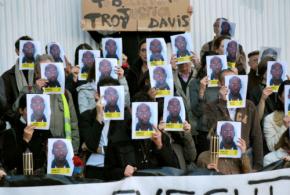Appeal denied for Troy Davis
reports on a federal appeals court ruling that could clear the way for an innocent man to be executed.
IN A blow to the hopes of his supporters and anti-death penalty activists, the 11th U.S. Circuit Court of Appeals denied Georgia death row inmate Troy Davis a new trial last week.
In 1989, Troy was convicted of the murder of off-duty police officer Mark MacPhail, despite the fact that there was no physical evidence tying him to the crime. Since then, seven of the original nine witnesses who claimed Troy was guilty have recanted, with several saying they were coerced by police into making false statements.
Of the remaining two witnesses who stand by their statements that Troy was the shooter, one was Sylvester Coles, who was initially a suspect himself--until he went to the police to say that Troy was the killer.
Despite this compelling evidence that Troy was wrongly convicted, the state of Georgia has tried to push forward with his execution three times in the past two years and has resisted all attempts to have this evidence heard in court.
Last fall, Troy came within two hours of execution before the Supreme Court stepped in with an emergency stay of execution. But with no explanation, the Supreme Court later announced it wouldn't take up Troy's case.

Then, in late October, a three-judge panel of the 11th U.S. Circuit Court of Appeals halted another execution date so Troy's lawyers could make their case that evidence of his innocence should be heard.
That appeal was rejected last week. Two of the three judges who deliberated on the appeal decided that Troy could not establish by clear and convincing evidence that a jury would not have found him guilty.
In a dissenting opinion, Judge Rosemary Barkett challenged this reasoning, writing:
In the affidavits, seven of nine key trial witnesses recanted their testimony which pointed to Davis as Officer MacPhail's murderer. The two remaining non-recanting witnesses were Sylvester "Red" Coles, who was himself alleged to have been the shooter in affidavits, and Steve Sanders, who identified Davis at trial two years after the incident, despite admitting to police immediately following the shooting that he would not be able to recognize the shooter.
The majority of the affidavits support the defense's theory that, after Coles raced to the police station to implicate Davis, the police directed all of their energy toward building a case against Davis, failing to investigate the possibility that Coles himself was the actual murderer. For example, none of the photospreads shown to eyewitnesses even included a picture of Coles. Additionally, three affiants now state that Coles confessed to the killing.
To execute Davis, in the face of a significant amount of proffered evidence that may establish his actual innocence, is unconscionable and unconstitutional.
THE COURT'S ruling allows for a 30-day stay for Troy to appeal to the U.S. Supreme Court--after that, the state will be free to seek Troy's execution yet again.
As Amnesty International said in a statement following the decision, "If Troy Davis' request had been granted by the Court, he would have had the opportunity to ask for an evidentiary hearing. An evidentiary hearing would allow the witnesses to be heard and examined in a court of law--which is what Davis has asked for all along."
Despite the ruling, Troy, his family--including sister Martina Correia, who has led the struggle for her brother--and anti-death penalty activists remain committed to continuing the fight for his freedom. As Troy stated:
I want you to know that the trauma placed on me and my family as I have faced execution and the death chamber three times is more punishment that most can bear. Yet as I face this state-sanctioned terror, I realize one constant--my faith is unwavering, the love of my family and friends is massive, and the fight for justice and against injustice by activists worldwide has ignited a fire that is raging for human rights and human dignity...
We must dismantle this unjust system, city by city, state by state, and country by country...Never stop fighting for justice, and we will win!


